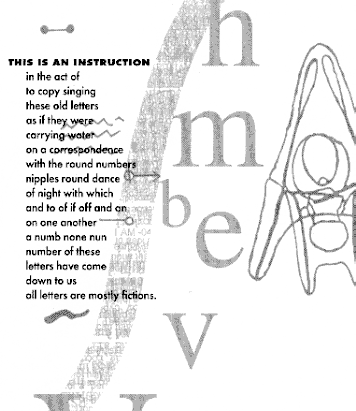|
In space, sense is redefined, made palatable and abstract. The notion of other life is so remote and unlikely that meaning itself strikes against the intelligence as a barbaric act of war. Death is irrelevant, and only the universe gazing at its primordial nakedness gives any hint of gentle purpose. Nothing is prominent, not eyes or minds or hair or hands or faces, nothing except perhaps repetition. Words reproduce by mitosis, as single cells do, as universes do. This book, this four-color lithograph, this string-quartet of primordial ooze is not about the Arizona Desert in the so-called United States but the Arizona Desert that is its exact duplicate in anti-space, an austere Arizona Desert made up of truckloads of oversized letters. Somewhat pretty and presentable, it is so fundamental in its intent and import that it is capable even of breaking the ice at family reunions. The ‘strange things’ that happen are strange in the sense of life-like. They are words in the time of silence, a dying campfire peered at by pairs of slanted, glowing yellow eyes. Basinski, Sorin and Drake themselves are only humble scientists, recording the unchangable pattern of data that either wears a mask to cover its identity or openly portrays a nature embedded with chaos.
Our planet is a planet of barriers that cause the inhabitants to hope to stumble upon some shiny car lot barbecue of reassuring nothingness. Where is this Arizona Desert? ‘What did you go out to the desert to see? People dressed in fine clothes?’ People dressed in fine clothes aren’t in deserts. This is a desert that has not yet been located. Wendy Collin Sorin’s artwork that permeates the collection, flowing and weaving through and around Basinski’s words, with lettristic authority and visual magnification, is like a treasure map that offers, rather than one contested point where the treasure lies hidden, an infinite number of rewarding, easily accessible possibilities. Luigi-Bob Drake has orchestrated Basinski’s granite conjugations and Sorin’s artwork into a nine-page sketchbook-sized memorandum — readable both ‘upside-down’ or ‘right-side up’ — that the most Republican of space men would find trustworthy. And Basinski, with a imperturbability so accustomed to clerical errors that it welcomes them, is able to broach the controversial subjects that stir up trouble in every solar system — from lynch mobs to lesbian vampires, from I don’t feel like it tonight to it’s hot as hell down here — with a sensitivity that offends only in that it seems to say nothing.
In the end, there is only one thing to say — ‘peace and love.’ But confusion makes that message seem fantastic. We would sooner believe a simple code. Everyone sends messages into outer space, but perhaps we are sending the wrong message. Let me quote from new, uncollected poems by Basinski that might better by example give direction, this one titled ‘Alphabet April One’ (perhaps not a good choice; other poems are titled ‘Wysh’ and ‘Squids Indisputable Siphonopoda’)
diskskys above poplar tops
shake loose rain
bunches of radishes
garlips and onions
boltsov cheeze
the relative abundance of macroscopic organisms
oorganization
|

